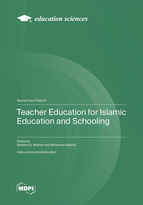Teacher Education for Islamic Education and Schooling
A special issue of Education Sciences (ISSN 2227-7102).
Deadline for manuscript submissions: closed (15 August 2024) | Viewed by 32715
Special Issue Editors
Interests: teacher education; equity; inclusion; culturally responsive pedagogies; Islamic education/schooling/pedagogy; faith-based pedagogies
Special Issues, Collections and Topics in MDPI journals
Interests: Islamic studies; sociology; psychology; public health and health services; religion and religious studies; communication and media studies
Special Issues, Collections and Topics in MDPI journals
Special Issue Information
Dear Colleagues,
The blossoming field of Islamic education studies (Sahin 2019) is increasingly drawing research attention on the realities and opportunities of Islamic K-12 schools, Islamic religious education in state-funded schools, conceptual understandings of education in the Islamic tradition, and approaches to learning in informal sites of education for Muslim children globally. However, in support of the growth and development of formal and informal sites of Islamic education and schooling, there is also a blossoming sector of teacher education.
Over the past decade in particular, several accredited university-level teacher education programs have been established across Western contexts. The University of South Australia (Australia), home to the co-editors of this Special Issue, established a Graduate Certificate in Education (Islamic Education) in 2017. Both Bayan College (USA) and Markfield Institute of Higher Education (UK) offer a M.A. in Islamic Education. The University of Vienna, along with numerous other European universities, offer a Master’s program in Islamic Religious Education (IRE). In addition to accredited programs, there are a plethora of professional learning opportunities emerging for educators in Islamic school settings. Summer institutes, online short programs, conferences, and professional learning communities all contribute toward the array of opportunities available.
This Special Issue focuses on the conceptualization, development, implementation, and impact of teacher education programs for educators in Islamic schools and educators who teach Islamic religious education.
We invite both conceptual and empirical contributions. Conceptually, we are interested in papers that grapple with understandings of education in the Islamic tradition in relation to contemporary educational thought that informs teacher education programs. Empirically, we invite contributions related to the development, implementation, and impact of existing teacher education initiatives (including non-accredited informal professional learning).
In this Special Issue, research areas may include (but are not limited to) the following:
- Program design and/or conceptualisation of distinct islamically informed teacher education
- Professional dilemmas in program design or facilitation
- Professional dilemmas for educator enactment
- Program accreditation within secular higher education
- Novel approaches to teacher education grounded in Islamic education theory
- Fostering Islamic conceptions of reflection, critical, and reflexive thinking
- Educator enactments of professional learning
- Educator efficacy, agency, and/or personas
The editors particularly welcome responses where the research has been undertaken in a co-participatory manner with key stakeholders (e.g., educators in the field) involved in the process.
We look forward to receiving your submission.
Dr. Nadeem A. Memon
Prof. Dr. Mohamad Abdalla
Guest Editors
Manuscript Submission Information
Manuscripts should be submitted online at www.mdpi.com by registering and logging in to this website. Once you are registered, click here to go to the submission form. Manuscripts can be submitted until the deadline. All submissions that pass pre-check are peer-reviewed. Accepted papers will be published continuously in the journal (as soon as accepted) and will be listed together on the special issue website. Research articles, review articles as well as short communications are invited. For planned papers, a title and short abstract (about 100 words) can be sent to the Editorial Office for announcement on this website.
Submitted manuscripts should not have been published previously, nor be under consideration for publication elsewhere (except conference proceedings papers). All manuscripts are thoroughly refereed through a double-blind peer-review process. A guide for authors and other relevant information for submission of manuscripts is available on the Instructions for Authors page. Education Sciences is an international peer-reviewed open access monthly journal published by MDPI.
Please visit the Instructions for Authors page before submitting a manuscript. The Article Processing Charge (APC) for publication in this open access journal is 1800 CHF (Swiss Francs). Submitted papers should be well formatted and use good English. Authors may use MDPI's English editing service prior to publication or during author revisions.
Keywords
- Islamic/Muslim education
- Islamic/Muslim schooling
- Islamic pedagogy
- reflective practice
- professional learning communities
- teacher education
Benefits of Publishing in a Special Issue
- Ease of navigation: Grouping papers by topic helps scholars navigate broad scope journals more efficiently.
- Greater discoverability: Special Issues support the reach and impact of scientific research. Articles in Special Issues are more discoverable and cited more frequently.
- Expansion of research network: Special Issues facilitate connections among authors, fostering scientific collaborations.
- External promotion: Articles in Special Issues are often promoted through the journal's social media, increasing their visibility.
- Reprint: MDPI Books provides the opportunity to republish successful Special Issues in book format, both online and in print.
Further information on MDPI's Special Issue policies can be found here.







